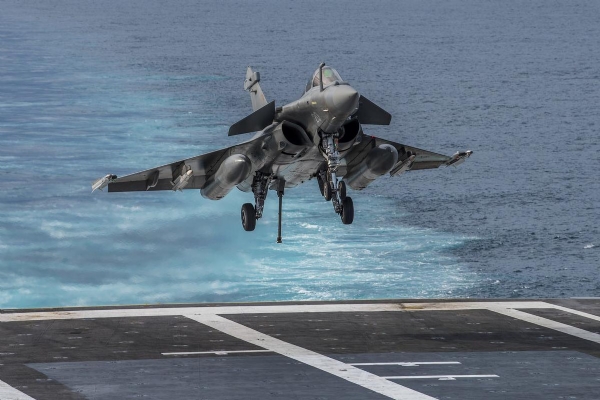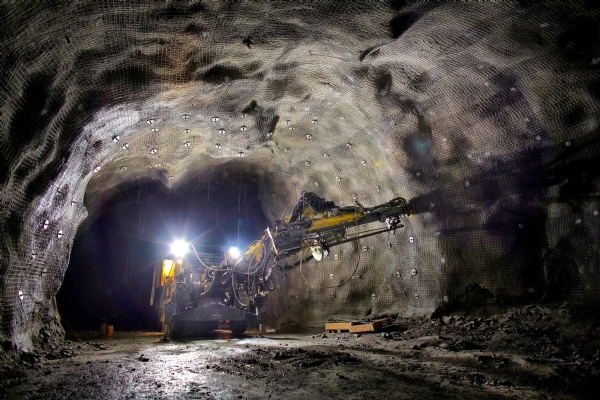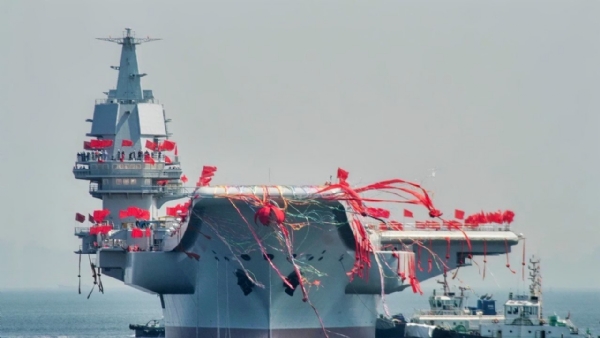#SecurityScan 86: Project 75I Submarine Venture, Chinese Satellite Capabilities & more
US ‘taking steps’ to impose visa restrictions on Hong Kong, mainland Chinese officials over national security law implementation
Total Views |
This article is a summary of important events that have taken place in last one week affecting, India's national security.
News In Brief
Very strong relations with India; co-producing armored vehicles: US Defence Secretary Lloyd Austin at Shangri La Dialogue
At the Shangri La Dialogue in Singapore, US Defence Secretary Lloyd Austin praised the strong US-India relationship. He talked about advancements in co-producing armoured vehicles and fighter jet engines.

Countering Internal & External Security Challenges
Major Radhika Sen, born in Himachal Pradesh in 1993, is set to receive the UN Military Gender Advocate of the Year Award on May 30, coinciding with the International Day of UN Peacekeepers. She is the second Indian peacekeeper to receive this award, after Major Suman Gawani, who was honored in 2019 for her service with the UN mission in South Sudan. This prestigious award, established in 2016, recognizes the dedication of individual military peacekeepers in promoting gender equality across peacekeeping missions. It aligns with the principles of UN Security Council Resolution 1325 on women, peace, and security. The awardee is chosen from candidates nominated by force commanders and heads of missions from all peace operations, according to UN peacekeeping.
The Indian Navy requires a significant capacity boost to fulfill its role as a ‘net security provider’ in the Indian Ocean region.
Emerging Threats
India faces a medium-term challenge from the Chinese PLA Navy, which has increased its presence through regular patrols in the Indian Ocean. This heightened activity underscores the need for India to enhance its naval capabilities.
Project 75I Submarine Venture
After much deliberation, the Indian government is nearing a decision on the Rs 60,000-crore Project 75I submarine venture. This project involves evaluating tenders from two companies: one partnered with a Spanish firm and the other with a German one. A crucial technology under assessment is Air-Independent Propulsion (AIP), which allows conventional submarines to remain submerged for extended periods.
Strategic Partnerships
Under the Strategic Partnership Model, L&T has joined forces with the Spanish company Navantia, while Mazagon Dock Shipbuilders Ltd has teamed up with ThyssenKrupp Marine Systems. These partnerships aim to enhance India's submarine capabilities and address its strategic needs.
Urgency of Modernization
The urgency for advancing Project 75I has intensified due to recent developments. In April, the first of four AIP submarines built by China for Pakistan was commissioned. Pakistan already operates French AIP-equipped Agosta 90B submarines and has signed a deal with China for four additional AIP-equipped submarines, with four more to be built in Karachi.
Current Naval Capabilities
India currently has 17 conventional submarines, 11 of which are decades old, and two nuclear ballistic missile submarines dedicated to strategic deterrence. Besides the Project 75I submarines, India has considered developing nuclear-powered attack submarines, but this concept remains on the drawing board due to budget constraints.
To effectively counter regional threats and assert its role as a net security provider, the Indian Navy needs a substantial capacity boost, starting with the timely execution of Project 75I and further modernization efforts.
India must enhance its ability to defend against massed drone assaults, particularly in light of recent developments in the Middle East.
Changing Strategic Landscape
The strategic landscape of the Middle East has been significantly altered by the ongoing volley of attacks between Iran and Israel. On April 1st, an Israeli attack on the Iranian consulate in Damascus resulted in the deaths of seven Islamic Revolutionary Guard Corps commanders. Two weeks later, Iran retaliated with a barrage of drones, almost all of which were intercepted. Israel swiftly responded with its own missile and drone attack on an Iranian airbase.
Regional Security Implications
These exchanges are poised to shape regional security and politics in the Middle East for the foreseeable future. A pressing question arises: is the world ready for another war amid high tensions in West Asia and ongoing conflict between Russia and Ukraine? This situation mirrors the Cold War era, with the Soviet Union backing the Arab front and the United States supporting Israel. Today, a similar trend emerges with Iran and Russia closely allied, while Israel receives backing from the US. This dynamic extends beyond the Iran-Israel relationship, involving broader regional and global power influences, thereby complicating matters.
India's Defense Strategy
For India, it is imperative to integrate diverse defense systems into its overall air defense architecture. This integration will create a robust and layered defense against drone threats, whether they arise from conflicts in the Middle East or elsewhere. By implementing such measures, India can ensure comprehensive protection against drone incursions, bolstering its national security in an increasingly complex geopolitical landscape.
Satellite images show China's J-20 stealth fighters near Indian border in Sikkim RELATED The China challenge: The nuts and bolts of Rs 50,000 cr fighter jet deal India to start talks for 26 Rafale Marine jets:

Here's all about the 'omnirole' naval fighter plane Synopsis Satellite images reveal China's deployment of J-20 stealth fighters near the Indian border in Tibet. This strategic move places the advanced aircraft within proximity to India, raising regional tensions. India counters with its Rafale fighters and upgraded air defenses, including the S-400 system. Both nations are enhancing their military capabilities along the border, emphasizing the need for vigilance in the region. Satellite images taken on May 27 reveal that China has stationed its advanced J20 stealth fighter jets less than 150 kilometers from India's boundary in Sikkim. The images, provided by All Source Analysis, show six J-20 fighters at a dual-use military and civilian airport in Shigatse, Tibet. This airport, at an altitude of 12,408 feet, is among the world's highest. Also visible in the images is a KJ-500 Airborne Early Warning and Control Aircraft.
"The J-20 stealth fighter is China's most advanced operational fighter aircraft to date. The deployment at Shigatse is notable as these aircraft are typically based in China's eastern provinces.
India’s Growth Tops 8%, Giving Boost to Modi as Vote Ends, GDP grew 8.2% in the fiscal year ended March, above forecasts, Alternative measure of growth shows slowdown last quarter
India’s economic growth topped 8% in the fiscal year that ended in March, faster than expected, giving Prime Minister Narendra Modi’s government a boost days before election results are announced.
Gross domestic product rose 8.2%, the Statistics Ministry said Friday, above the 7.9% forecast by economists in a Bloomberg survey. For the January-March quarter, GDP grew 7.8% from a year ago, higher than expected, but lower than the revised 8.6% expansion in the previous quarter.
#COUNTERING CHINESE MULTI DOMAIN , GREY ZONE, HIGH BREED WARFARE
Marcos Swipes at China, Vowing Not to Yield in Disputed Sea,‘Filipinos do not yield,’ Marcos declares at Singapore forum, Philippine leader speaks with Chinese minister in audience
Philippine President Ferdinand Marcos Jr. asserted his nation’s claims in the disputed South China Sea while taking pointed swipes at Beijing during a speech at Asia’s top security forum — as China’s new defense minister sat in the audience.
With the Philippines and China locked in a standoff over disputed islands and reefs, Marcos used his speech Friday night at the Shangri-La Dialogue in Singapore to call out “assertive actions that aim to propagate excessive and baseless claims through force, intimidation, and deception.”
America Still Retains a Soft Power Advantage over China
Chinese (and many Western) analysts believe that China will surpass the U.S. as the world’s largest economy by 2030. With the slowdown in China’s rate of economic growth, some push the date into the later part of the next decade. But China may not own the future. After all, India, which is now more populous than China, is an important rival in the East, and coordinates some policies with the U.S. And in terms of alliances, China, Russia, Iran and North Korea together comprise about a fifth of the world economy, while the U.S., Europe, Japan and other democracies represent more than half.
That is why soft power is important. While military and economic hard power usually prevail over soft power in the short run, the attractiveness of soft power helps to hold alliances together for the long run. By enhancing alliances, soft power is a force multiplier.
If the U.S. pays attention to attracting other countries and maintaining its alliances, China will not surpass us in hard or soft power. But if we act in ways that turns our backs on others, all bets are off.
Chinese Satellite Capabilities Assessment
Of the 848 Chinese satellites operating today, 179 are military and intelligence satellites, 271 are civil (including the Beidou constellation for navigation and timing), 362 are commercial, and 36 are academic. To put this in perspective, the United States has a total of 6,975 operational satellites today — eight times as many as China — and since 2015, the total number of U.S. satellites has increased by over 2,100%.
Blurred Lines of Chinese Satellite Use
Military leaders are concerned because the lines between Chinese military, civil, and commercial satellites are blurred. In a conflict, the United States expects that all Chinese space assets can and will be used by the military. This is not the case for the United States, where the vast majority (94%) of satellites are commercial.
Comparison of Military Satellites
When comparing the total number of Chinese satellites to only U.S. military and intelligence satellites, the picture changes. The United States has just 300 military and intelligence satellites in operation — roughly a third of China’s total space assets.
Leveraging U.S. Commercial Space Innovation
China’s rapid advances in space and counterspace technology are concerning, but even more concerning is the United States’ failure to fully leverage the innovation of its own commercial space sector. The creation of the Commercial Augmentation Space Reserve (CASR) is a step in the right direction, but it is only a small step. It merely creates the option to use commercial satellites in a crisis, akin to the Civil Reserve Air Fleet, which has been used only three times in its 73-year history.
Call to Action for U.S. Space Strategy
Congress and the executive branch should heed the warnings about China’s space capabilities. Although the United States enjoys a substantial lead in space technology, China is moving quickly to copy U.S. technology and counter the advantage it provides. It is time to get serious and make hard choices. It is time to unleash the Space Force.
Critical minerals need insulation from China’s market manipulation
Risks in Investment
Investors can handle various risks, including those related to construction, interest rates, and weather. With hedging, they can even manage price movements in product markets. However, one risk they cannot price is political risk—the chance that government actions could ruin profits. Unlike other risks, you can’t hedge against political risk.
The Challenge of Political Risk

This issue becomes particularly significant in the context of the critical-minerals market. The chief executive of Iluka, a critical-minerals company, recently accused China of rigging rare earths prices. He pointed out that monopolistic production and interference in pricing are leading to market failure. This raises the question: how should we respond when price risk is essentially political risk?
Potential Policy Responses
From a political perspective, establishing a floor price for critical minerals presents an advantage. Taxpayers would only pay for results, unlike with soft loans, which can lead to significant losses if mines fail to produce. This approach could mitigate the impact of China’s market manipulation.
Need for Policy Intervention
Liberal democracies have been slow to move away from the free market orthodoxy in response to new geostrategic realities. China's manipulation of the market for critical minerals demands interventionist policy responses. It's time to reconsider our approach and protect our interests against such political risks.
Undersea chokepoints: The Red Sea cable disruptions,The recent attacks on the Red Sea sub-sea cables serves as a wake-up call for governments to focus on increased international cooperation on protection, and diversification of subsea cable systems
Months after the Houthi assaults on commercial sea-faring vessels traversing the Red Sea, the rebels exacerbated pressures on the Western governments by damaging critical sub-sea optic fibre cables near the Yemeni coast. Sub-sea cables are essential global telecommunications infrastructure and carry 99 percent of global internet traffic. The Red Sea hosts more than 15 such sub-sea cables responsible for connecting Europe and Asia, carrying 80 percent of Asia’s westward traffic. Globally, that is equivalent to 17 percent of data traffic.
China Fear Grips G-7 With Draft Raising Alarm at ‘Harmful’ Trade, Ministers unite around language on cross-border commerce, Communique is set to be adopted after meetings
China’s outsized role in world trade is alarming global finance chiefs, who are poised to forge a united front in Italy priming their nations to challenge “harmful practices.”
A draft communique formulated at the Group of Seven meeting in the lakeside resort of Stresa introduces much stronger common language than the club adopted just one year ago when it met in Niigata in Japan and last month in Washington.
China’s local governments shut down social media accounts as budgets shrink

Once seen as key propaganda tools, agency apps and websites disappear as funding cuts, staff shortages and internet trolls make maintenance a ‘burden’
Beijing’s cyber watchdog has ordered local authorities to streamline operations as ‘zombie’ accounts and white elephant projects proliferate.
US starts delivering drones under programme aimed at China’s growing military
The UAVs are part of Replicator initiative focused on overcoming advantages of the People’s Liberation Army.Pentagon says the unmanned system will include drones used in Ukraine war, which are likely to be deployed in the Indo-Pacific region.
China's drills against Taiwan likely 'preordained' with 'room to escalate',Experts see key differences from 2022 exercises as military-civilian lines 'blur'
Communist China has never controlled Taiwan, home to 23 million people, but claims it as its own and has refused to rule out an attack.
"The drills are not simply a retaliation against Lai's inaugural address on May 20. China has been building up pressure on Taiwan in the run-up to the presidential inauguration, including expanding the use of controversial flight paths close to the airspace of Taiwanese islands near the Chinese coast.
As compared to the drills China conducted in 2022 after then-U.S. House Speaker Nancy Pelosi visited Taipei, Chinese forces do not appear to have fired live missiles so far. "Beijing is testing Lai but wants to leave some room to escalate further in the future, when, for example, Lai visits the U.S. or a senior U.S. official visits Taiwan."
Lin also highlighted how China has sent coast guard ships to surround Taiwan's outlying islands, especially Kinmen and Matsu, which Beijing wants to use as leverage over the Taiwanese government. China stopped recognizing the de facto demarcation of territorial waters in recent months, in a break from the status quo.
The use of civilian platforms -- namely the coast guard -- as part of the exercises is new and "blurs the lines between military and civilian capabilities."
"Operations near Dongyin in the Matsu chain were also a new development, as was the fact that one of the restriction zones established by the PLA around Taiwan -- the one east of Taiwan -- was substantially closer to Taiwan's 24 nautical mile contiguous zone than in 2022.
China drone carrier or not, the battle for naval supremacy in Asia just got murkier
Recent chatter about a drone carrier joining China’s growing fleet of aircraft carriers points to the intensifying race on the military tech front.
Unmanned aerial vehicles are now so commonplace, not just for surveillance but as attack weapons as well. We’ve heard, too, of unmanned submarines and remotely piloted ships. Are we moving now to the era of the drone carrier?

Short weeks after China’s newest aircraft carrier Fujian tested her engines and was moved from her berth in the Yangtze River Delta ahead of just-completed initial sea trials, come reports that hidden away in a yard further up the Yangtze, an altogether different carrier is taking shape – one touted as the world’s first fixed-wing drone carrier.
World At War-Lessons For India
Civil Rights and Antisemitism at Columbia University,A hostile environment for Jews could mean a cutoff of federal funding and liability under Title VI of the 1964 Civil Rights Act.
If failure is the best teacher, several Ivy League schools are in contention for the title of 2023-24 Teacher of the Year. In December, Harvard and the University of Pennsylvania distinguished themselves when their presidents failed to give a straight answer to lawmakers who asked if advocating genocide of Jews violated their schools’ disciplinary codes; both presidents soon resigned. But this spring, Columbia might have outdone them.
Protesters set up an unauthorized encampment on South Lawn and defied the administration’s demands to shut it down. “We don’t want no Zionists here!” they screamed into bullhorns. “Globalize the intifada!” Jewish students said they were barred from clubs, assaulted, threatened and spat on for speaking Hebrew.
US Warns China of Coordinated Action Against Russian War Support,‘Profound displeasure’ at China-Russia relationship: official
US increasingly warning Beijing about indirect support of war
The US will coordinate with allies to punish Chinese firms that are helping Russia bolster its military-industrial base, including potential sanctions against financial institutions, two senior US officials said on Friday.
In focus are Chinese firms “that have been involved in a systematic way in supporting Russia,” Kurt Campbell, deputy secretary of state and Joe Biden’s former Asia policy czar, said Friday. “We’ve also looked closely at financial institutions.”
US ‘taking steps’ to impose visa restrictions on Hong Kong, mainland Chinese officials over national security law implementation
US Department of State spokesman Matthew Miller says country ‘deeply concerned’ over recent guilty verdicts in case of 47 activists
‘In response, we are taking steps to impose visa restrictions on PRC and Hong Kong officials responsible for implementing the national security law.
--



